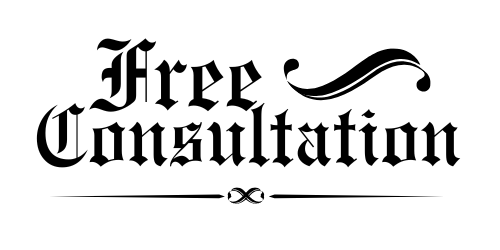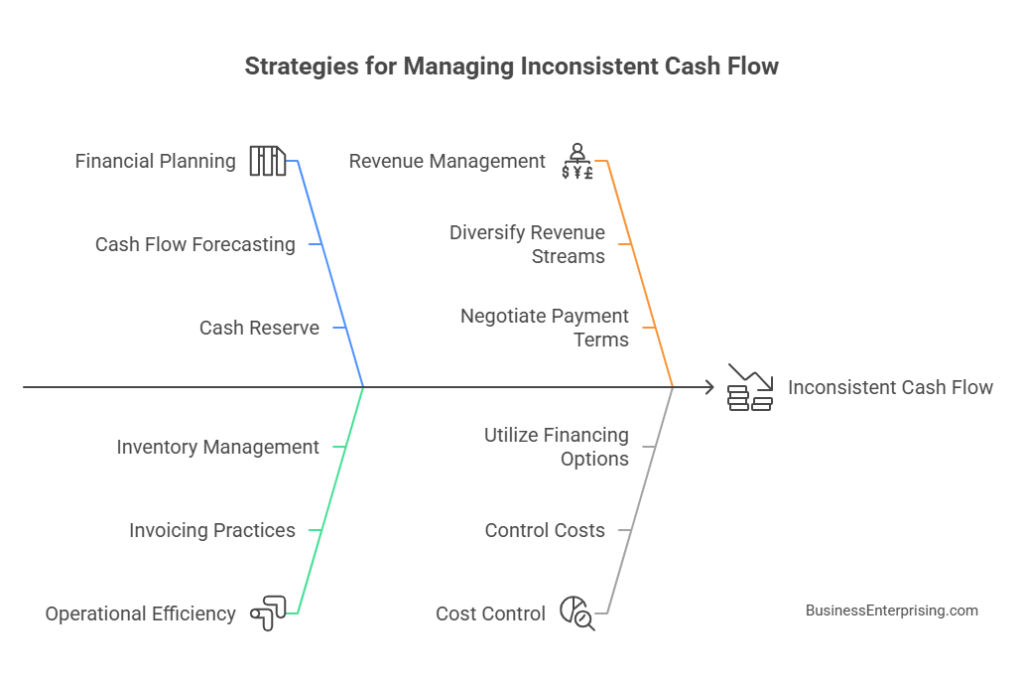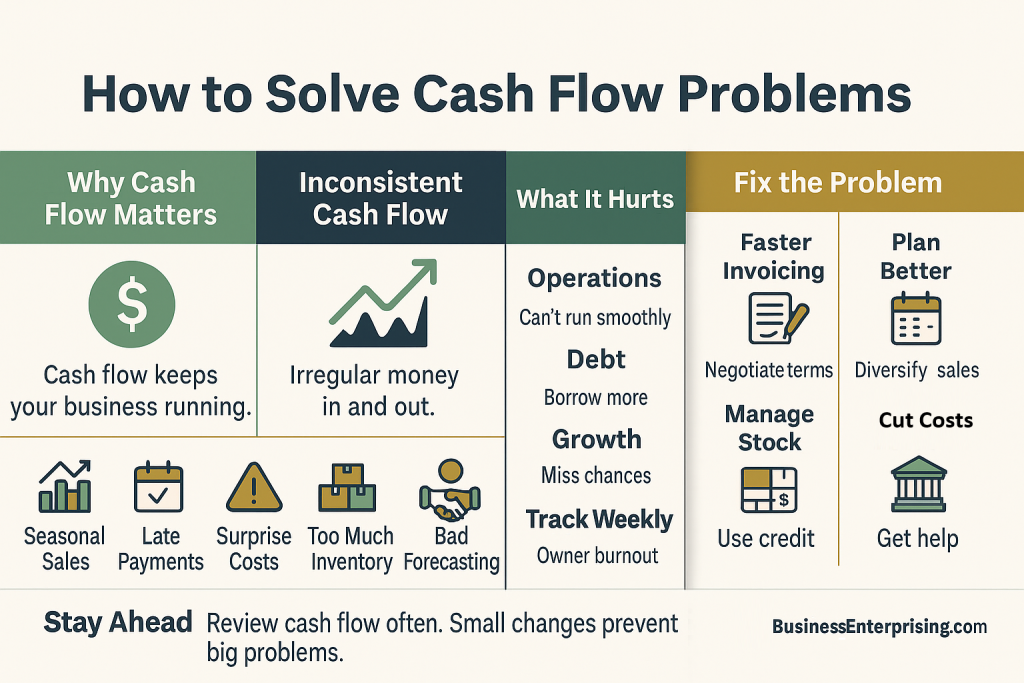 Knowing how to solve cash flow problems is a skill all business owners need, regardless of the industry or size of their enterprise. Cash flow is the lifeblood of any business, representing the money that flows in and out of the company. When this flow is inconsistent, it can create significant operational challenges, impacting everything from day-to-day operations to long-term growth strategies.
Knowing how to solve cash flow problems is a skill all business owners need, regardless of the industry or size of their enterprise. Cash flow is the lifeblood of any business, representing the money that flows in and out of the company. When this flow is inconsistent, it can create significant operational challenges, impacting everything from day-to-day operations to long-term growth strategies.
Understanding Inconsistent Cash Flow
Inconsistent cash flow occurs when a business experiences fluctuations in the amount of cash coming in and going out over a given period. These fluctuations can be due to various factors, including seasonal sales variations, delayed customer payments, unexpected expenses, and poor financial management. The inconsistency can make it difficult for businesses to meet their financial obligations, such as paying suppliers, employees, and other operational costs.
Causes of Inconsistent Cash Flow
Several factors can contribute to inconsistent cash flow:
Seasonal Sales Fluctuations: Many businesses, particularly those in retail or tourism, experience significant variations in sales throughout the year. Peak seasons may bring in substantial revenue, while off-peak periods can see a drastic reduction in cash inflow.
Delayed Customer Payments: Late payments from customers can create cash flow gaps. When clients do not pay their invoices on time, it disrupts the expected cash flow and can lead to financial strain.
Unexpected Expenses: Unforeseen costs, such as equipment repairs, legal fees, or emergency purchases, can disrupt cash flow. These unexpected expenses can strain financial resources, especially if not planned for.
Overstocking or Understocking: Inefficient inventory management can lead to cash flow issues. Overstocking ties up cash in unsold goods, while understocking can result in lost sales and dissatisfied customers.
Poor Financial Planning: Inadequate financial planning and budgeting can lead to cash flow inconsistencies. Without a clear understanding of income and expenses, businesses may struggle to maintain a steady cash flow.
Impacts of Inconsistent Cash Flow
Inconsistent cash flow can have several adverse effects on a business:
Operational Disruptions: Cash flow issues can make it difficult to cover day-to-day expenses, such as payroll, rent, and utilities. This can lead to operational disruptions and affect the overall efficiency of the business.
Increased Debt: To manage cash flow gaps, businesses may resort to taking on debt, such as loans or credit lines. While this can provide short-term relief, it increases the financial burden and can lead to long-term financial challenges.
Missed Opportunities: Inconsistent cash flow can prevent businesses from seizing growth opportunities, such as investing in new projects, expanding operations, or taking advantage of favorable market conditions.
Strained Relationships: Cash flow problems can strain relationships with suppliers, creditors, and employees. Delayed payments to suppliers can affect the supply chain, while late payroll can lead to employee dissatisfaction and turnover.
Stress and Anxiety: Managing cash flow issues can be a significant source of stress for business owners. The constant worry about meeting financial obligations can affect decision-making and overall well-being.
Strategies for Managing Inconsistent Cash Flow
Understanding how to solve cash flow problems may seem impossible at times. Despite the challenges, there are several strategies that businesses can implement to manage and mitigate inconsistent cash flow:
Improve Cash Flow Forecasting:
Accurate cash flow forecasting is essential for identifying potential cash flow gaps and planning accordingly. Regularly reviewing and updating cash flow projections can help businesses anticipate and prepare for fluctuations.
Implement Efficient Invoicing Practices:
Streamlining the invoicing process can reduce delays in customer payments. Implementing electronic invoicing, setting clear payment terms, and following up promptly on overdue invoices can improve cash flow consistency.
Establish a Cash Reserve:
Building a cash reserve can provide a financial cushion to cover unexpected expenses and cash flow gaps. Setting aside a portion of profits during good times can help businesses weather periods of low cash flow.
Negotiate Favorable Payment Terms:
Negotiating extended payment terms with suppliers can help align outgoing payments with incoming cash. Additionally, offering incentives for early payments from customers can encourage timely payments.
Optimize Inventory Management:
Effective inventory management can free up cash tied in unsold stock. Implementing just-in-time inventory practices and regularly reviewing inventory levels can ensure that capital is not unnecessarily locked up.
Control Costs:
Keeping a close eye on expenses and reducing unnecessary costs can help maintain a healthier cash flow. Conducting regular expense audits and identifying areas for cost savings can improve financial stability.
Diversify Revenue Streams:
Relying on a single source of income can exacerbate cash flow issues. Diversifying revenue streams by offering new products or services, entering new markets, or creating passive income sources can provide more consistent cash flow.
Utilize Financing Options:
While taking on debt should be a last resort, having access to financing options such as lines of credit or short-term loans can provide a safety net during cash flow shortages. It’s important to carefully manage and repay any borrowed funds to avoid long-term debt issues.
Monitor Cash Flow Regularly:
Regular monitoring and analysis of cash flow can help identify trends and issues early. Using financial management software can provide real-time insights and make it easier to track cash flow.
Seek Professional Advice:
Consulting with financial advisors or accountants can provide valuable insights and strategies for managing cash flow. Professional advice can help businesses develop a robust financial plan and navigate cash flow challenges effectively.
Knowing how to solve cash flow problems can significantly improve business operations and growth. With proactive planning, efficient management practices, and strategic financial decisions, businesses can mitigate the effects of cash flow fluctuations. By improving cash flow forecasting, optimizing invoicing and inventory management, controlling costs, and seeking professional advice, business owners can navigate cash flow challenges and build a more stable and resilient enterprise. The key is to remain vigilant, adaptable, and proactive in managing cash flow to ensure long-term success and sustainability.


